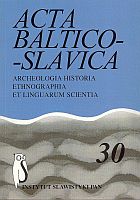Tarminio kalbėjimo kultūrinis aspektas
A cultural aspect of speaking a dialect
Author(s): Daiva AliūkaitėSubject(s): Language and Literature Studies
Published by: Instytut Slawistyki Polskiej Akademii Nauk
Keywords: perceptual dialectology; dialectal speech; expressiveness; culture
Summary/Abstract: All human beings are subjects of their culture, and language is central to their cultural identity. Standard languages do not possess any representative and expressive reality; meanwhile the dialects, in contrast, can be analyzed in terms of cultural perspectives, since any reality is related to place, world concept, epistemic competence, etc. Drawing on theoretical insights and research strategies of perceptual dialectology this article deals with the following issues: (a) the dialectal representation of regional culture, and (b) the dialectal background as a way of identifying the speaker by other participants of the discourse. It is common knowledge that each isogloss, each local unit consists of smaller dierentially marked units. Consequently, every individual can be geographically localized on the basis of certain peculiarities of his/her speech with respect to the habitation or at least to the place of origin on the one hand, and on the other, the speaker can be attributed to a certain local culture and its linguistic stereotypes. The latter statement of the article acknowledging that the dialectal expression enables the participants of the discourse to characterize the speaker is based on the data of a perceptual questionnaire. It is noteworthy that appraising dialectal speech ordinary people (na?ve interpreters) identify it as partly understandable, not quite correct or neither correct nor incorrect, very attractive or sometimes attractive. Dialectal speech is defined locally and socially, there are no hard and fast rules for treating a particular speech as dialectal, and its usage is tolerated both in private and public discourse. On the one hand, dialectal speech is associated with old people, with villagers; on the other, it is linked to expressive, emotional, traditionconscious, original, and daring people.
Journal: Acta Baltico Slavica
- Issue Year: 2006
- Issue No: 30
- Page Range: 567-583
- Page Count: 17
- Language: Lithuanian

